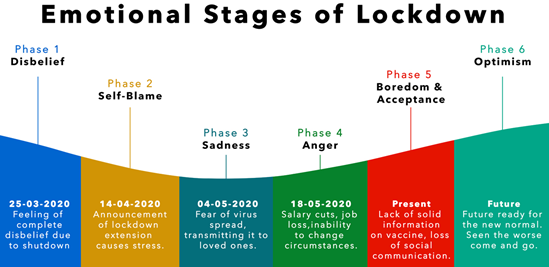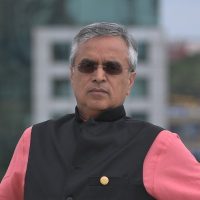For months people throughout the world have been living in what I call ‘COVID Silos’, staggering through the phases of ‘Lockdowns’ first and now the ‘Un-Lock’. In all these months the media too has contributed to scaring the public so much, that it is going to take some time for all of us to realize a true sense of freedom again.
Personally, I seldom allow myself to focus on the deserted street that I can see from my windows at home. The hushed winds brushing against the lonely trees and the chirping of birds at the empty crossroad is more palpable than usual, almost solid. And with these sounds and sights, I feel the brimming of hope– a day when our irrepressible spirits will defy this pestilence, where Covid-19 will be relegated to the annals of history. A post-Covid-19 world is inevitable.
But for now, this time also allows me to think through, read a lot, and building materials that I did like to speak about later. During one of my think-through sessions, I was hovering over the COVID phases in India and was thinking about how the psychology of the country traversed. I believe that feelings are real things, ignoring them may not cause any danger, but learning from the phases of these feelings is sure to add up to your experience for good.
I have tried to jot down the crux of the emotional phases that we all endured in the past few months of lockdowns and un-lockdowns. Here is a gist of it:
Emotional Stages Of Lockdown
Phase 1: Disbelief
When lockdown 1 in India was put in place from 25th March 2020 with an almost total shutdown of everything from services to factories, the feeling was of ‘complete disbelief’.
Many would have had plans, the leaders would have formed strategies, you would have had thought of looking out for greener pastures, but everything came to a standstill, the mind too was shut, unable to analyze.
Phase 2: Self-Blame
Phase 2 was lockdown 2, when our Prime Minister on 14th April 2020 announced an extension of the lockdown till 3rd May 2020, promising a conditional relaxation after 20th April for regions where the spread could be contained.
Emotionally this phase caused strong negative emotions including fear, and stress and impacted the mental health of many worldwide. One of the emotions linked with mental health and infectious disease is self-blame and regret.
Many studies conducted recently investigated the role of fear of COVID-19 and perceived stress in the relationship between self-blame regret and depression. This is because during this phase many people started perceiving that environmental challenges are beyond an individual’s capacity to cope.
Phase 3: Sadness
Phase 3 was lockdown 3 when the Ministry of Home Affairs (MHA) and Government of India (GoI) further extended the lockdown to two weeks beyond 4th May. Many were completely engulfed with stress. There was fear of infection, transmitting the virus to the loved ones, lack of information all of which led to sadness.
A phase where many would have found themselves sobbing. The entire structure of your life lay shattered, everything changed so suddenly, that there was confusion which led to a prolonged feeling of misery in people.
Phase 4: Anger
Sadness coupled with a feeling of inability to change the circumstances led to the state of anger in lockdown 4
Though this was the phase that came with additional relaxation, when the National Disaster Management Authority (NDMA) and the Ministry of Home Affairs (MHA) extended the lockdown for a period for two weeks beyond 18 May, with additional relaxations, mostly the emotional phase was of anger.
There was barely any freedom to move around. People were angry about it, some irritated with the whole ‘wearing mask’ concept, also salary cuts were disheartening. Others had lost jobs and were waiting for better days to start looking again, but the half freedom meant more work from homes and fewer interviews.
Phase 5: Boredom and Acceptance
This is the phase that we are in NOW. Lack of information about the vaccine and boredom, and loss of social communication, that has somehow compelled us to accept the situation, and look for ways and means to survive and recuperate.
The whole ‘Make in India’ concept came as a breath of fresh air when startups went on a hiring spree. People started accepting the new normal of wearing masks and going out, being at home as much as possible, no option as most of us are working from home. When the dust of depression settled, many started liking this phase of ‘New Normal’.
Phase 6: Optimism
Phase 6 for me is the end of the year, and I see us more Future-ready. We have seen the worse come and go, plans made and flopped, labors migrating out of fear, most of them are back to base, people who once took health lightly have become conscious, I have even witnessed younger generations thinking more about savings than shopping.
So, for me the end of 2020 is optimistic. People around the world are emotionally maturing, many have survived Corona, rendering hope to others too.
Conclusion:
Being a Heartfulness meditation practitioner and teacher I believe in looking at the positive side of every adverse scenario. I now see developments on the social front, people are connecting online more, there is a sense of social wellbeing among people, and this sounds optimistic.
The positive side of this situation according to me is that you are seeing increased interaction, increased transaction volumes, and increased business opportunities.
As a technology entrepreneur who has been in this field for more than three decades, I can tell you one thing that recession is the phase when the best ideas can be put into action. Some of the big companies like Google, Uber, Facebook, etc. were conceptualized during the recession.
So, I am optimistic that COVID has embarked on a new normal that will show us the road to a better future.
Do you think the way I do? Share your thoughts.







Read 0 comments and reply